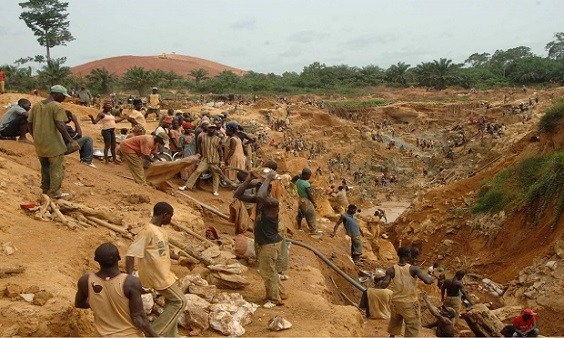Gov’t introduces integration project ahead of lifting of ban on small-scale mining
In preparation towards the lifting of the ban on artisanal and small-scale mining operations, the Lands Ministry is planning to roll-out the Multi-Sectoral Mining Integrated Project (MMIP).
Land Minister, Kwaku Asomah-Cheremeh, said the project will hinge on three main pillars: statutory enforcement, social interventions and technological adaptations.
Addressing the media during a Meet The Press session in Accra Tuesday, he noted that “the objectives of the project include to regulate and assist Artisanal and Small-scale Miners (ASMs) to improve the efficiency of their operations.”
According to him, MMIP is also targeted at ensuring the use of appropriate, safe and affordable technology in small-scale mining.
Again, the minister said it is aimed at developing alternative livelihood projects in mining communities.
“MMIP will train miners on sustainable mining practices and extraction processes as well as ensure stakeholders enforce the law reserving small-scale mining for Ghanaians,” he said.

In August this year, the government announced the roadmap for lifting the ban on artisanal and small-scale mining operations which has been in effect since April 1, 2017.
In dealing with illegal mining popularly known as galamsey, the government set up, at the level of the Cabinet, an Inter-Ministerial Committee on Illegal Mining.
The Committee, at the commencement of its work, recommended an initial 6-month ban on small-scale mining activities, a request which was assented to by the President.
The ban has, since then, been extended.
Outlining the roadmap to lifting the ban on ASMs, Mr Asomah-Cheremeh said “although the MMIP has not yet been rolled out, Sustainable Livelihood Programmes (SLP) are being carried out to mitigate the socio-economic impacts of mining on host communities in Dunkwa and its environs.”
He added that “this is to protect the natural habitat from been encroached on by illegal miners. A total of 7,667 acres of oil palm plantation was established in 2017. Also,1,442 farm families benefitted from the project in 2017.”
According to the Lands Minister, the majority of the beneficiaries are youth and mostly first-time farmers.
“Most of the beneficiaries of the project, notably the youth, are known to have been previously involved in illegal mining activities.
“The youth in the project areas see the intervention as a key source of livelihood and it is hoped that it can be sustained over a longer period,” he said.
source: Myjoyonline



